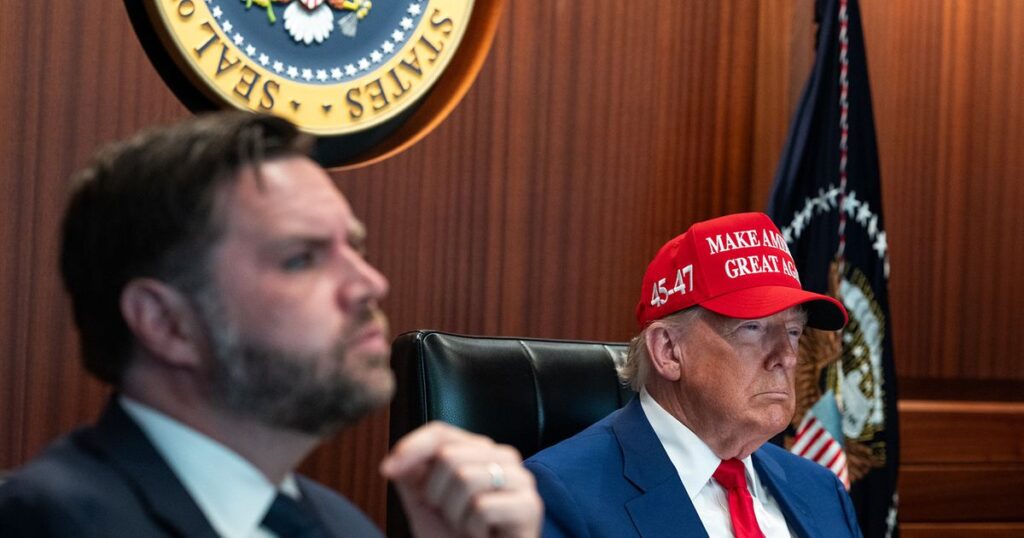Practically six months into Donald Trump’s presidency, a Trump Doctrine is coming into view. Opposite to the fears of his critics, and the hopes of some admirers, Trump is not any isolationist. And opposite to those that declare Trump is solely a marvel of advert hockery and inconsistency, there’s a distinctive sample to the insurance policies he has pursued.
This Trump Doctrine emphasizes utilizing American energy aggressively — extra aggressively than Trump’s quick predecessors — to reshape key relationships and accrue U.S. benefit in a rivalrous world.
In doing so, Trump has blown up any speak about a post-American period. But he has additionally raised troubling questions on whether or not his administration can wield America’s outsized affect successfully and preserve it sturdy.
The isolationist label has lengthy adopted Trump, however it’s by no means precisely described an idiosyncratic man. Sure, Trump disdains core parts of U.S. globalism, from the worldwide commerce system America established to its promotion of democratic values and its protection commitments world wide.
But Trump has additionally argued that America ought to assert itself extra forcefully in a cutthroat world. And at the moment, as Trump pursues a capacious view of presidential energy at house, he’s providing an equally bold conception of American energy overseas.
Trump rails towards lengthy, expensive nation-building efforts. However he has nonetheless waged two brief, sharp Center Japanese conflicts: one to discourage Yemen’s Houthis from attacking U.S. forces and Purple Sea delivery, the opposite to roll again the Iranian nuclear program. A number of U.S. presidents pledged to make use of pressure to maintain Tehran from crossing the nuclear threshold; Trump actually did it. That’s not the coverage of a person in thrall to the Republican Get together’s Tucker Carlson wing.
In the meantime, Trump began commerce wars towards dozens of nations, in hopes of reshaping the worldwide economic system. He deployed diplomatic leverage, and specific threats of abandonment, to remake the transatlantic discount by getting European allies to spend far more on protection. Trump additionally wielded America’s innovation energy — its function in designing high-end semiconductors — to convey Saudi Arabia and the UAE into Washington’s tech bloc and make them companions in his push for “AI dominance.”
Nearer to house, Trump used veiled threats to pry Panama out of China’s Belt and Street Initiative. He has demanded territorial concessions from Panama, Denmark and Canada. On the identical time, Trump touts his Golden Dome missile defend, meant to guard the homeland and provides America larger freedom of motion towards its foes.
This isn’t standard-issue, post-1945 American internationalism: It’s onerous to think about prior presidents telling allies to yield their land. However neither is it a retreat into Fortress America. And by making use of American energy in such energetic, omnidirectional vogue, Trump has revealed a lot concerning the true state of world affairs.
Coverage journals brim with articles about American decline and the arrival of multipolarity. However Trump, in his inimitable approach, has reminded so many nations the place energy actually lies. For instance: The strike on Iran demonstrated America’s distinctive international army attain and its capacity, along with Israel, to reshape the Center East whereas relegating Russia and China — nominally Iran’s allies — to the sidelines.
Trump’s key perception is that the world’s sole superpower has extra muscle than generally understood. But the Trump Doctrine nonetheless suffers from three huge issues.
First, its train of energy is weakened by its dearth of technique. Trump’s commerce struggle received off to a farcical begin as a result of he failed to contemplate how sky-high tariffs may wreck the U.S. economic system — a real-time discovery that compelled a fast, humiliating climb-down. A president who privileges the artwork of the deal over mental consistency generally pursues contradictory insurance policies: Trump’s tariffs towards Indo-Pacific allies erode their prosperity and make it more durable for them to spend extra on protection.
Second, a president who generally struggles to tell apart associates from enemies generally fails to level U.S. energy in the fitting course. Trump delights in taking goal at U.S. allies. He has been extra reluctant to confront Russia, whilst Vladimir Putin makes a mockery of Trump’s want for peace in Ukraine — and despite the fact that Putin’s struggle economic system is more and more weak to the industrial and monetary coercion that Trump so usually threatens to make use of.
Third, the perfect presidents construct U.S. energy for the longer term, however Trump dangers depleting it as an alternative. Perhaps the One Huge Lovely Invoice will juice the economic system — or perhaps it should lock in structural deficits that constrain army spending and development. Slashing overseas help saves little cash however squanders U.S. international affect; the struggle on universities threatens the analysis ecosystem that underpins America’s financial and army may. Furthermore, a coverage of robust love towards allies might flip into mutually harmful hostility, and a superpower that usually coerces its associates might wreck the comfortable energy that lubricates key relationships.
Trump revels in utilizing U.S. energy, however he doesn’t fairly perceive the place it comes from. That’s the central irony, and elementary weak spot, of the doctrine guiding his administration at the moment.

